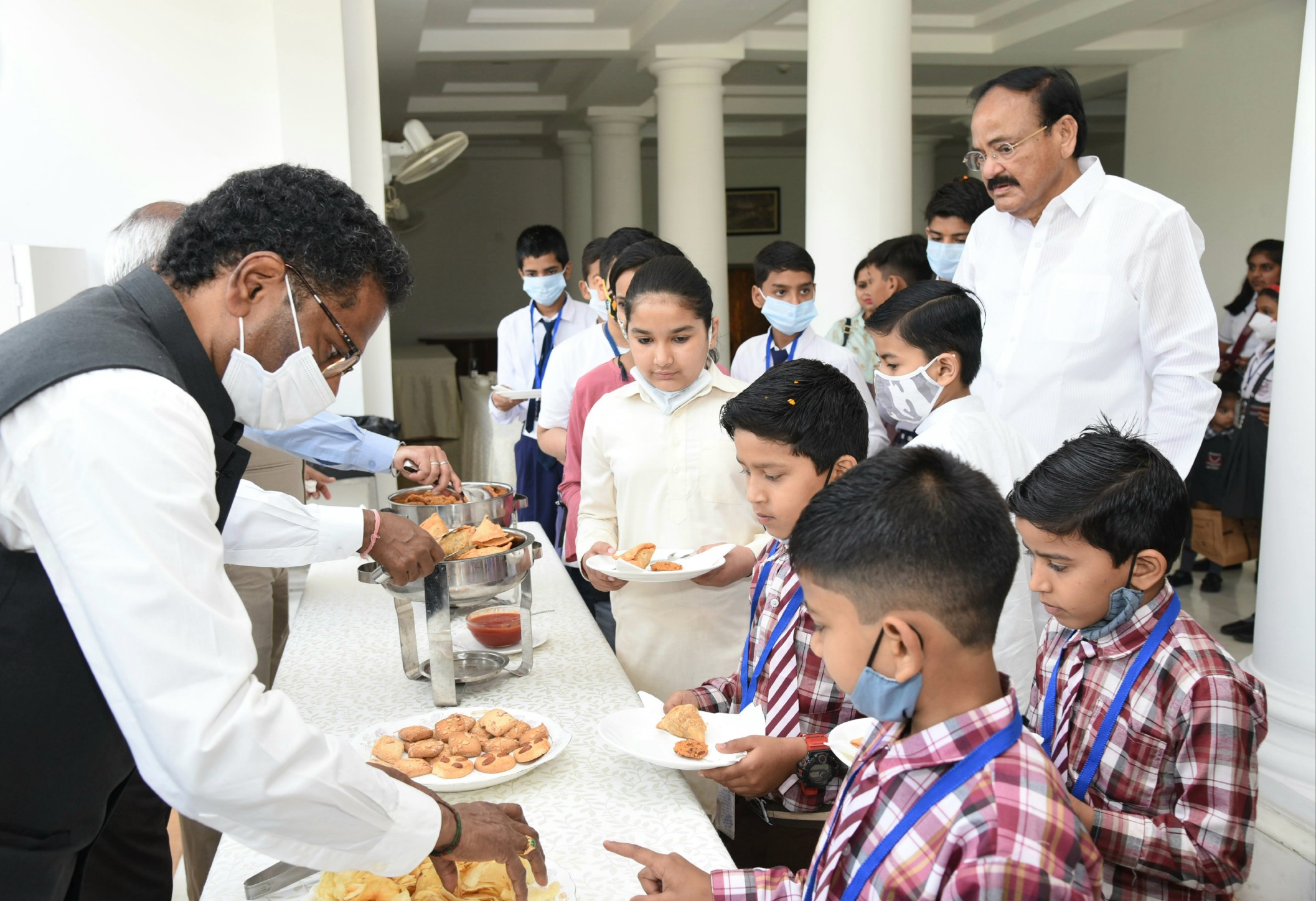Naidu celebrates Holi with school children
Instead of water balloons and gulal, the Vice President M. Venkaiah Naidu on the occasion of Holi faced many interesting pointed questions from school children who came to greet him and celebrate the festival of colours. Naidu answered their queries and treated the children and the Rajya Sabha Secretariat staff at Upa-Rashtrapati Nivas to sweets and snacks. They were from four Delhi schools, including those run by the Municipal Corporations. When a student asked whether he ever got demotivated, Naidu replied, “Not at all, but sometimes, I get disillusioned when some parliamentarians do not behave up to standards in the House.” Asked how he balanced his official duties and family responsibilities, Naidu said, “During my active political career, I could not do justice to the family but after becoming the VP, now I do try to spend time with my family.” He added: “As the Vice President and Chairman of Rajya Sabha, I have constitutional duties and obligations to perform, but I always make it a point to talk to my granddaughter and grandson.”
What If Muslim Women In Police, Forces Insist On Wearing Hijab?
The Muslim school and college girls’ hijab issue in
Karnataka has dangerous repercussions. Although the Karnataka High Court has not allowed it, its decision on this contentious hijab issue has reached, as expectedly, the Supreme Court doors to test the constitutionality of Karnataka Government and its education department’s decision banning hijab as a religious attire. A uniform dress code, whether in educational institutions or at any work place or field is basically meant to establish bonding and commonality among everyone without any religion coming into the picture. Imagine if hijab is permitted in educational institutions, then it may soon creep into the other areas of the society, whether it is corporate houses, factories, shops, airlines, tourism and hospitality sectors, hospitals and sports, etc., wherever a uniform is in place. And imagine if some women officers and jawans in the police
Divergent views exist even among Muslim intellectuals whether Muslim religious practices require hijab as an essential dress code for women. And whether the Indian constitution which conferred protection to religious practices and beliefs as fundamental rights include wearing of hijab as one such religious practice. Today, it is hijab, tomorrow it might be burqa and then other religious communities’ may also insist on permission for their students and others to wear religious symbols over their respective uniforms. But the burning question is why hijab issue has cropped up now? It would be interesting to know if educational institutions in earlier regime of Congress-JD and BJP-Yediyurappa government allowed hijab to co-exist with school uniform or alternatively girls at that time did not insist on hijab once inside school/college. The fact that this crisis has not hit other southern states or states with large Muslim population like Telangana, Uttar Pradesh and West Bengal shows that the flare up in southern Karnataka has more political overtones to it. Is it an exercise for the next Assembly polls? Both Hindu and Muslim extremist groups have been stirring the pot to polarise communities for their political gains.
Vax Hesitancy: NGO ropes in Masjid clerics
Amid indications that the Muslim community’s participation in the vaccination drive has been a lukewarm—reasons for the apparent hesitancy ranging from personal to misplaced fears about the possible ill-effects—some religious leaders and clerics are encouraging people to join the mass vaccination drive. One such notable effort has been made by the clerics of a Tughlaq-era mosque, Kali Masjid, in south Delhi’s Sheikh Sarai-Savitri Nagar area near Malviya Nagar. The mosque, with intricate carvings and well-maintained centuries-old tiled-interiors, but with a three-storey modern façade, has hosted two rounds of vaccination camps. An NGO, Aarohan, roped in the Masjid, which also houses a boys boarding madrasa, for vaccinating several hundred people, including its students and area residents, which also included members of the other communities. Aarohan’s vaccination camps were in association with the Centre for Advocacy and Research with active support of Azim Premji Foundation. Aarohan’s chairperson Rani Patel told The Sunday Guardian that special purdah system was created for those minority community women and girls who were earlier hesitant to take the vaccine in the open.

